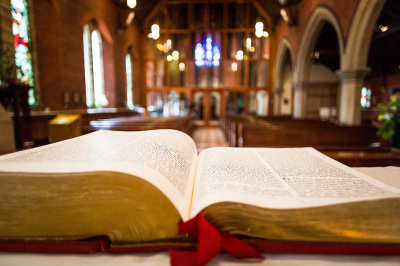Can we really trust the Bible? Reasons for confidence

Can you really trust the Bible? In other words, why should Christians believe that the 66 books of the Bible are God’s final and authoritative revelation for the Church age? This question of the “canon” has been and will continue to be fiercely debated. Therefore, it is critical that Evangelical Christians have confidence in, and are able to articulate a brief defense of, the trustworthy nature of the composition of the Bible.
In this article, I will explain how the 66 books of canonical Scripture comprise all of God’s final and authoritative revelation for the Church age. The two-part nature of this point is important to note. The 66 books are final in the sense that the canon is closed. There will be no more new books added. The 66 books are also the ultimate authority for the Church in this present age, that is, the only rule of faith and practice between the ascension of Jesus Christ and His second coming.
Theologian Wayne Grudem’s answer to this question, found in his book Systematic Theology: An Introduction to Biblical Doctrine, can be summed up in a single word: Obedience. Grudem argues,
“The precise determination of the extent of the Canon of Scripture is therefore of the utmost importance. If we are to trust and obey God’s word we must have a collection of words that we are certain are God’s own words to us.”1
It is indeed of the “utmost importance” that Christians know with confidence they have all of “the perfect law that gives freedom” (James 1:25) and the same faith that has been “once for all entrusted to the saints” (Jude 3).
So, first, how can we know that the 66 canonical books of the Bible comprise all of God’s final revelation for the Church age? Put another way, how can one be sure that no books are missing? Or that no books were wrongly included?
From an overarching theological perspective, Christians can rest in God’s sovereignty. The God of the Bible is a God under whose watch a sparrow doesn’t fall to the ground unnoticed (Matthew 10). Surely such a sovereign God could ensure that a complete copy of his life-giving written revelation would be accurately created, collected, and preserved.
From the beginning of the Israelites’ corporate history, when God instructed His people to preserve copies of His written revelation in the Ark of the Covenant (Exodus 32, Deuteronomy 10), stretching to the final book of the Bible, in which the Apostle John records a dire warning about adding to or subtracting from Scripture (Revelation 21), God impresses upon His people both the importance and existence of an accurate record of His written revelation.
From a historical perspective, one may be surprised to learn just how early and confidently the current canon took shape. Almost 500 years before Christ, it was largely understood that the Old Testament had been completed, with the additions of Ezra, Nehemiah, and Esther. To this point, Grudem argues, “Thus, after approximately 435 B.C., there were no further additions to the Old Testament canon,” and that in the views of Josephus, a celebrated first-century Jewish historian, there had been “no more ‘words of God’ added to Scripture after about 435 B.C.”2
Additionally, a list of all the canonical Old Testament books (except for Esther) was composed in A.D. 170 by Melito of Sardis, as recorded by Eusebius, an early Greek historian of Christianity.3 It is also crucial to note that Jesus Christ affirmed the Old Testament as Scripture in Luke 24 when He interpreted the Pentateuch and the Prophets as testifying to His life as the Messiah.
With regard to the 27 canonical books of the New Testament, the historical record is also straightforward. Of the 27 books, 22 were written by apostles, who had the authority to write Scripture as eyewitnesses of the life of Christ. Under the inspiration of the Holy Spirit, it is clear that Peter understood what Paul was writing to be Scripture at the present time since he refers to Paul’s writings in the same sentence as “other Scriptures” (2 Peter).
And less than 300 years after Peter and Paul’s death, the early Christian Church had recognized the 27 books that comprise the New Testament today as complete. Grudem writes that “In A.D. 367, the 39th Festal Letter of Athanasius contained an exact list of the twenty-seven New Testament books we have today … Thirty years later, in A.D. 397, the Council of Carthage, representing the churches in the western part of the Mediterranean world, agreed with the eastern churches on the same list.”4
Translated by B.F. Westcott, in A General Survey of the History of the Canon of the New Testament, we can also read that the Council of Carthage decreed:
“It was also determined that besides the Canonical Scriptures nothing be read in the Church under the title of divine Scriptures. The Canonical Scriptures are these … Of the New Testament: four books of the Gospels, one book of the Acts of the Apostles, thirteen Epistles of the Apostle Paul, one epistle of the same [writer] to the Hebrews, two Epistles of the Apostle Peter, three of John, one of James, one of Jude, one book of the Apocalypse of John.” 5
Ultimately, the early church, the eastern church, and the Protestant tradition rejected the inclusion of the seven apocryphal books that the Roman Catholics affirmed as Scripture at the Council of Trent. The apocryphal books clearly do not claim the same authority for themselves as other Old (and New) Testament books do. Further, some of the apocryphal books teach doctrines that are contrary to the weight of the rest of Scripture, such as works-based righteousness.
Another more fundamental question with regards to the canon is this: Does the Church make Scripture or simply recognize Scripture? The Protestant answer to that question is and always has been a resounding “Only recognize!” According to 2 Timothy 3, all Scripture is God-breathed, not council-decreed. As theologian Roger Nicole puts it: “The Church’s authority is at most designative, not constitutive. It may be compared to the power of the bailiff who announces: ‘Here comes the judge.’”6
Next, let’s consider the question of whether the 66 canonical books of the Bible are final. In other words, why should we believe that the 66 canonical books of the Bible are the authoritative revelation for the Church age?
The simple answer is, “Because God says so.” And in this case, the simple answer is also the correct one. God, as Creator, has complete authority over creation (Genesis 1, Psalm 115). Acting with this unbounded authority, God has chosen to reveal Himself both in creation (Psalm 19), through written revelation (Exodus 32, 2 Timothy 3, Luke 24), and in His Son, Jesus Christ (Hebrews 1). While natural revelation is evident, it is not specific, neither in regard to salvation nor the life of the Church. And while He will come again, Jesus Christ currently sits in bodily form at the right hand of the Father in Heaven.
Therefore, the Church has been left with God’s written revelation, complete and final, to serve as its authority in this age, the Church age. Fuller Seminary’s original founding statement put it well:
“The books which form the canon of the Old and New Testaments as originally given are plenarily inspired and free from all error in whole and in part. These books constitute the written Word of God, the only infallible rule of faith and practice.”7
Conservative Evangelicals rightly understand that it is Scripture, and Scripture alone, that must serve as the authority for the Church — both the specific local churches where geographically limited believers covenant together and Christ’s universal Church as composed by all of the saints.
One of the linchpins of this authority is the doctrine of inerrancy. George Marsden, in his book Reforming Fundamentalism, explains the outworking of inerrancy on the authority of Scripture while chronicling the debates over this doctrine in the mid-20th century:
“God would not inspire an error, small or large. Furthermore, Jesus’s use of the Old Testament implied that he regarded it as historically accurate in detail. In the end, if one said that parts of the Bible were inerrant and other parts had error, who was to decide which was which? What standard higher than the Bible itself was to be used?”8
The answer is none. There is no standard higher than the Bible. Therefore, the Bible is the only authoritative revelation for the Church age. We can have this confidence today — and always.
1. Wayne Grudem, Systematic Theology: An Introduction to Biblical Doctrine (Grand Rapids: Zondervan, 1994), 54.
2. Grudem, Systematic Theology, 56.
3. Ibid, 58.
4. Ibid, 64.
5. B.F. Westcott, A General Survey of the History of the Canon of the New Testament (Cambridge: Macmillan and Co., 1881), 440.
6. Roger Nicole, Standing Forth: Collected Writings of Roger Nicole (Ross-shire: Christian Focus Publications, 2002), 97-98.
7. Matthew Barrett, God’s Word Alone: The Authority of Scripture (Grand Rapids: Zondervan, 2016),118.
8. George Marsden, Reforming Fundamentalism: Fuller Seminary and the New Evangelicalism (Grand Rapids: Eerdmans, 1987), 213-214.
Originally published at the Standing for Freedom Center.
William Wolfe is a visiting fellow with the Center for Renewing America. He served as a senior official in the Trump administration, both as a deputy assistant secretary of defense at the Pentagon and a director of legislative affairs at the State Department. Prior to his service in the administration, Wolfe worked for Heritage Action for America, and as a congressional staffer for three different members of Congress, including the former Rep. Dave Brat. He has a B.A. in history from Covenant College, and is finishing his Masters of Divinity at The Southern Baptist Theological Seminary.
Follow William on Twitter at @William_E_Wolfe




























